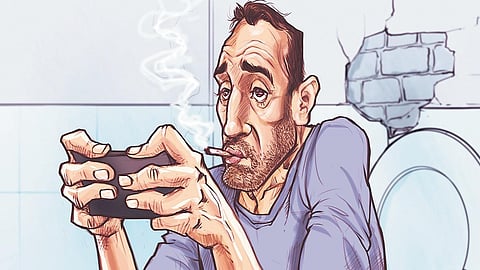

We once considered smoking cool. Take any films of the early sixties or seventies, and the hero and the villain or anyone who mattered had a burning cigarette in scenes that wanted to look stylish.
Smoking helped people come together, and it became a symbol of social status. Browsing through old tobacco ads would make us cringe.
Smoking was macho, it defined men; they advertised it as an aftershave and what not. Tobacco companies spent crores on advertisements, hired the top-rated stars and sportspersons.
Some even had the galls to say so many doctors recommended some cigarettes were good for health, much like many toothpaste advertisements of today.
Somewhere in the last decade, governments woke up to the health hazard of smoking. In 2003, India banned tobacco advertisement except at point of sale, and had banned smoking in public places by 2008.
The anti-tobacco ad about the 25-year-old Mukesh who died of lung cancer or the ubiquitous announcement voice-over about spongy lungs has been drawing groans and smirks in the theatres for the past few years.
The government also went for the overkill, when it directed all films to have a scrolling line about the dangers of smoking or consuming alcohol in any movie when a character lights up a cigarette or has a drink. Parliament had banned narcotic drugs long ago through the Narcotic Drugs and Psychotropic Substances Act of 1985.
Cigarette, alcohol or narcotics are hazardous and addictive, goes the government wisdom. There can be no dispute about the same, but it is surprising that it allows a more addictive and lethal product, a free run in society, and cares nothing about it.
The small screen addiction is destroying lives, creating psychological issues, depression, riots, and political upheaval across the world.
If tobacco has nicotine that causes addiction, social media uses more powerful tools to hook up its users and keep them in its grip. It is addressing human curiosity and the fear of losing out. Having a few hundred friends is impossible in the real-world, but social media makes having 5,000 friends appear so natural.
If we have a few hundred friends in the virtual world, it is natural for someone or the other to have a vacation or buy a new vehicle every day.
It creates deep insecurity in its users. Every day, we see someone vacationing in some exotic location, purchasing a new car, moving to a new home, and leading a much better life than ours. The impression the social media gives is that everyone else is having a great time and leading a successful life while we are stuck in a rut.
The irony is that everyone feels the sense of not keeping up, even the more successful ones in a conventional society.
The Artificial Intelligence (AI)-powered photo filters make everyone appear like models, something a mirror at home can hardly do, and all these combine to provide a sense of inadequacy and dissatisfaction with life.
If you are not paying for something, you are not the customer, but the product. We are being sold piecemeal to a hundred corporates. The AI that controls what kind of feed you should see does not have any moral antenna or social obligation.
It is a self-feeding machine system that ensures you are hooked to it. So if you watch a propaganda video peddling hatred, it feeds more and more such videos for you, and your confirmation bias would ensure that your opinions become hardened.
You would hardly hear or see any differing opinion as the system is providing you only the same feeds. Opinions harden, and the anonymity of social media helps many to vent out their prejudices only. This gets corroborated by many who think alike, again brought to the forum by AI.
Societies get fractured, opinions get divided to either extreme, with either side getting fed what they wish to hear and never getting a chance to listen to a divergent point of view.
Everything, including your mind, opinion and prejudices, is a product to sell for some corporate giants now. By feeding us with what our mind craves, the social media giants are making us hooked to the small screen.
We are working for free. That used to be called slavery once. We are the slaves of social media giants, chained to our phones. Isn’t it surprising that most valuable companies in the world now produce nothing, transport nothing or sell nothing? They have created a bait, and we have bitten it and become addicts. We are AI-controlled zombies now.
If those selling drugs that influence the human mind are drug lords, what would you call those who are controlling our minds through sophisticated algorithms that make you go back to their platforms again and again?
The number of tobacco or drug users in the world is a fraction of social media users. Remember, once smoking was also considered cool and a sign of social mobility.
It is not enough for the government to warn us that our lungs are spongy when our brains have turned spongier and are sucking up all the muck.
Social media content comes with a warning. We can start by making it mandatory to display this message for 30 seconds, every time your phone is refreshed: ‘Social media is not real, and it’s injurious to physical and mental health. Your time is getting sold. Get out of the web and get a life.’
Anand Neelakantan
Author of Asura, Ajaya series, Vanara and Bahubali trilogy mail@asura.co.in